VANDANA SHIVA is a world-renowned environmental thinker and campaigner. A leader in the International Forum on Globalization, recipient of the Alternative Nobel Peace Prize (the Right Livelihood Award) and of the Earth Day Award, she is the author of several influential books, including: Staying Alive, The Violence of the Green Revolution, Monocultures of the Mind, Biopiracy, and Stolen Harvest.



